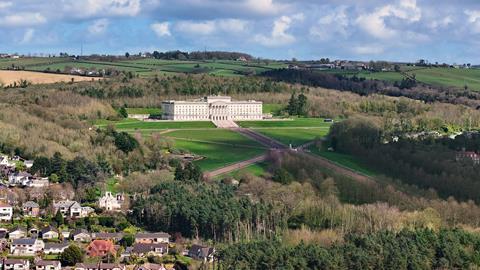The public housing authority’s expenditure on temporary accommodation has increased by more than sixfold in seven years
The Northern Ireland Housing Executive (NIHE) spent almost £28m on housing people in temporary accommodation in one year, a Freedom of Information request has revealed.

In 2022/23, the NIHE spent £27,788,686 on temporary accommodation, including £7.6m on “non-standard” accommodation such as hotels and B&Bs, and £15.4m on temporary single-let housing.
This represents an increase of just over 543% since 2016/17 when the housing executive spent £4.32m on temporary accommodation.
The number of placements in temporary accommodation by the non-departmental government agency exceeded 10,000 for the first time in 2022/23.
There were 10,254 temporary accommodation placements in 2022/23, compared to 2,746 in 2015/17, representing a 273% increase.
>> See also: CIH Northern Ireland says budget cuts are a ‘devastating blow’ to social housing development
>> See also: Waltham Forest Council green lights JV with Mears to buy 400 homes for use as temporary accommodation
The latest NIHE figures show that there are 47,312 applicants on the social housing waiting list in Northern Ireland.
A Housing Executive spokesperson said; “We have a statutory duty to provide temporary accommodation to those who present to us as homeless and may have a priority housing need.
“The last five years have witnessed an unprecedented growth in the number of households requiring temporary accommodation”.
The spokesperson added: “We always strive to ensure our temporary accommodation is of the highest quality. The majority of the temporary accommodation we utilise is ‘own front door’ accommodation, such as private, single lets”.
They added that the NIHE has ”increasingly had to use hotels and B&Bs on a temporary basis – with 400 households in this form of accommodation on any given night, currently”.
The spokesperson said that “While costs for temporary accommodation are under control, in the year ahead, we expect costs may again be impacted by continued demand, which will be subject to external factors, including the number of private landlords leaving the sector.
“To meet this challenge, we have established an internal task and finish group to explore future options for temporary accommodation across Northern Ireland.
“The group is making progress examining options for alternative and more financially sustainable options for temporary accommodation and already this year an additional 100 units of temporary accommodation have been added to our roster to provide suitable housing support to even more families in need.”
Justin Cartwright, director of CIH Northern Ireland said: “The Housing Executive’s expenditure on temporary accommodation exposes the severe lack of social housing investment in Northern Ireland. The reliance on expensive, non-traditional temporary solutions like hotels and B&Bs is unacceptable for both the people who need safe and affordable homes and for public funds.”
Cartwright added: “The situation is worsening due to disproportionate cuts to the Department for Communities’ capital budget. With fewer new homes being built, the number of people in temporary accommodation will only rise. The Northern Ireland Executive must prioritise building more social housing and preventing homelessness, not just managing homelessness after the fact.”
Last month, the Department for Communities’ capital budget for 2024/25 was cut by 38%. The budget announced on 25 April allocated £856m to the Department for Communities (DfC) for resource spending, covering day-to-day operations, and £133.4m for capital spending, earmarked for investments in projects like housing development.
CIH Northern Ireland described the cuts as “a devastating blow” which could result in 600 fewer social homes being built this year.











No comments yet